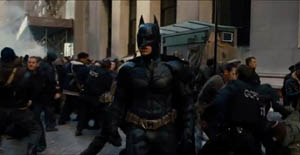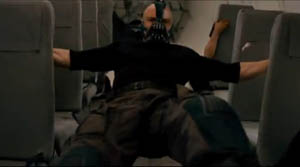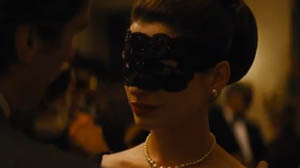|
Films like this, dear reader, are why I go to the movies in the first place: it's a usually failed attempt at finding something that precisely fits my niche. What we have here is a smart, well-made film hinging on character dynamics that also has an element of the fantastical, an escapist piece of art that does not require an escape from logic or intelligence. With The Dark Knight Rises coming on the heels of seven previous films of similar quality, Christopher Nolan has reaffirmed his position as one of the best writer-directors working today. 
This final film in the current Batman franchise owes more than mere titular similarity to comic author Frank Miller's seminal 1986 series/graphic novel The Dark Knight Returns, but for those unfamiliar with the work, think of this film as the superhero equivalent of The Good, the Bad, and the Ugly: a huge, sprawling epic ensemble piece of measured pace that seals its place amongst the best of its kind, a future standard-bearer. Eight years after Batman disappeared into the night after voluntarily taking the blame for District Attorney Harvey Dent's murder spree, Gotham City is poised in an eerie calm. With Dent's mass prosecution of the mob secured thanks to Batman's sacrifice of reputation, crime has diminished to manageable levels, but a flagging economy is brewing a quiet discontent in the streets, where the poor and disenfranchised are being assimilated into a revolutionary army. Rumors abound of a threatening individual named Bane, part terrorist, part spiritual leader to those with no hope. Like most such persons in real life, Bane offers no hope, merely its illusion, as his flock lines up to do his will. In degenerating physical health, Bruce Wayne prowls the corridors of his opulent but empty home, the stories of his reclusive behavior painting him as a modern-day Howard Hughes. The loss of his alter ego has left Bruce adrift and aimless, his once-mighty business empire languishing and untended as the bulk of its assets remain tied up in a so far unsuccessful clean energy project. One night, he discovers high-class cat burglar Selina Kyle helping herself to his personal possessions. She's stolen his late mother's pearls, but Bruce suspects she may have actually bagged something of far greater value. 
Moreso than either of its predecessors, The Dark Knight Rises is an ensemble piece, rather than the tale of one man against the world. A wounded Commissioner Gordon, still bitter over the terrible secret of Harvey Dent's true end, and a young idealistic detective named John Blake, who idolized Batman in his youth, attempt to pull the city back from the brink of anarchy. Having reinvented Batman, Nolan turns his attentions to Bane and Catwoman, last seen languishing in Batman and Robin and Catwoman, respectively. Bane is still a muscle-bound brute, but not a mindless one; where the Joker's endgame was ever-increasing chaos, Bane is far more goal-oriented, as he resurrects the specter of the League of Shadows, whose ruthless mode of keeping a check on corruption involves the wholesale destruction of societies they believe to be beyond saving. A sort of guru to those seeking a way out of their empty lives, he's almost jovial in his villainy, bringing the righteous menace of the true believer. Catwoman, stripped of the panopoly of cartoonish feline affectations that previously followed her filmic incarnations, is returned to her comic roots as a skilled burglar who's worked her way up from the streets, plying the only talents she's ever found effective in keeping her alive and well fed. In an exchange clearly inspired by present-day discontent growing between the haves and have-nots, Selina castigates the eccentric billionaire for seemingly grabbing such a large piece of the pie while others starve. Bane's response is less subtle, casting his enemy into the hellish prison where he himself grew up, bereft of hope. In imagery cutting striking parallels with the first film, Bruce Wayne once again finds himself at the bottom of a well, confronting his deepest fears. While Bruce has grown up, his fears have matured with him, replacing a childish fear of scary winged critters with the existential despair of utter helplessness. 
I lamented the fact, once it was known, that Nolan would not be featuring the Riddler in his final Batman film; the man's obvious love of puzzles made it seem an obvious choice. But the Riddler's absence makes this film no less a riddle than Nolan's wont. It may not possess the dizzingly labyrinthine structure of his Inception, one of the most audacious films to actually succeed with mainstream audiences, but it is in some ways more surprising with its revelations. Inception led us deeper into the dark but patiently explained the rules as it went. The Dark Knight Rises is a subtler mystery in that it does not come wearing the obvious trappings of one. In a key sequence, the film plays with audiences' expectations of what certain scenes in movies tend to mean as a way of slyly hiding its hand; I won't say more of the specifics. Far from being simply another episode in a series, this third film makes the entire Dark Knight trilogy feel like a cohesive whole, telling one giant tale of crime and morality. As is the case with good films, Rises presents dilemmas without telling us how we should feel about them. We tend to see our own issues encoded within ambiguous narratives; many have found the brutal destruction of an obvious Wall Street analogue to be an indictment of the non-violent Occupy movement, though how a script written in 2010 could be critiquing a 2011 movement that was ramping up right around the time the production was wrapping up is rather uncertain. Similarly, if, as some have claimed, Batman is a right-wing vigilante fantasy run amok, then why does Bruce Wayne invest the lion's share of his fortune in green energy and openly disdain firearms? The claims may be spurious, but there's no denying that the film is a reflection and product of its time. Batman Begins argued that Batman was a necessary step in a society filled with corruption. Its sequel rather convincingly argued that the reverse could be true, that vigilantism begats greater violence, and the justice system is preferable to an unchecked, self-appointed authority. The trilogy's final statement equivocates the most. The establishment, not being a singular entity, performs both acts of heroism and disappointing "Yes sir, how high, sir?" abandonments of personal initiative. But of Bruce Wayne and his alter ego, we have the clearest picture we could hope for. He is neither good because of his wealth, or newly good because of his subsequent economic downfall, but good because of his unwavering commitment to improving the lives of others. His methods are debatable, and will be debated endlessly, but whether needed to be or not, he's a hero. Wisely quitting while he's ahead, Christopher Nolan has stated categorically that this is his final foray into the world of Batman. Where his musings will take him next I've no idea, but in the words of Twin Peaks' Special Agent Dale Cooper, I'm sure it will be someplace both wonderful and strange. -review by Matt Murray
|
|
||||||||